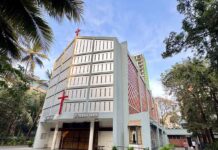A passionate photographer, Zoya Lobo is celebrated as being India’s first transwoman photojournalist. Her reportage of desperate migrant workers gathered outside Bandra railway station on the 14th of April, 2020 was commended and her photographs of the incident were published by famed media houses, namely Mumbai Mirror, The Times of India, Hindustan Times, PTI, AP, AFP, Lokmat, Pudhari Urdu Times and The Indian Express. In a rather ironic twist of fate, she found a new ray of hope and professional recognition around the same corner, as to where she first began to work, under duress one might add, begging in Mumbai’s local trains.
Having realised at an early age that she didn’t identify with either the male or female genders, she increasingly found herself out of place. Her journey of confronting her identity was mired with self-doubt and she had to wade through the currents of constant alienation. This emotion of feeling trapped consumed her childhood and she was unable to continue her education at an all-boys school. By the time she found a community that accepted her, she was already living away from her family and found herself with barely any line of work to pursue. This resulted in her begging in the local trains, however, this was not something she wanted to continue doing and yearned to break away from her circumstances. Zoya was also determined to create a new path that created opportunities for transgender community members. Nonetheless, no matter how much she contemplated other avenues of work she always was met with brick walls and therefore continued begging in trains.
It was her honest reaction and feedback to Vikas Mahajan’s short film titled ‘Hijara Shap Ki Vardan’ that landed her a job in the sequel. The film was well-received and during the film’s success party when Zoya got the opportunity to get on stage, she took advantage of the situation and spoke on behalf of the community and raised important questions. Her fiery speech and self-confidence caught the attention of Mr Shreeneth Singh, Editor of College Times Education Media, who offered her a job as a freelance reporter towards the end of 2019. This got her foot in the door, however, from a financial point of sustenance, it was still a very volatile proposition. She didn’t give up hope and continued to collect funds to acquire a camera. Zoya has a proclivity for images and wanted to experiment with photography, but didn’t know how to go about with it. She researched and sought the advice of photographers, and eventually learnt her tricks of the trade.
Zoya’s freelancer profile did not relieve her of financial woes and she continued to work the trains until she couldn’t anymore because of the lockdown. It was a challenging period as her source of income had come to a standstill, as was the case with many. The impending exodus of people like her, those who depended on the city’s bustle to earn a living got her recognition.
She narrates the happenings of the 14th of April 2020, “I was walking to Khar to receive a relief pack of groceries from a donor. As I walked past Bandra station I observed a large crowd. I knew right away that I should cover this incident, so I ran back to my home which luckily was not too far away and grabbed my DSLR camera. Once I reached the spot, I started taking pictures, of which many were picked by media houses.” Zoya’s presence of mind and capability won her accolades, her struggle was acknowledged as she also was assigned a few freelance projects by international publications La Presse & Quebec Science. At the present point in time, Zoya is working as a freelance photojournalist with Police Chitrpat & Fight Against Crime, digital publications, however, she is awaiting a full-time opportunity.
Zoya shares her inputs about what she thinks might make a change for individuals like her “First and foremost the education system should integrate and acknowledge our existence. If young minds are educated about our gender, it will surely create more acceptance for my community in the future, and we will be able to contribute to society. Secondly, when family members realize the identity of a child, they should be supportive and understanding rather than ostracize us. The prejudice exercised towards us should be stopped, and we must be allowed to integrate with society and build relationships with our fellow human beings.”
When individuals like Zoya accomplish such feats, they are appreciated by society and are regarded as those who ‘Break the Glass Ceiling’. However, although shrouded by this fancy compliment, one cannot turn a blind eye to the all-encompassing question that being, ‘Who are the ones to create this glass ceiling to begin with?


























